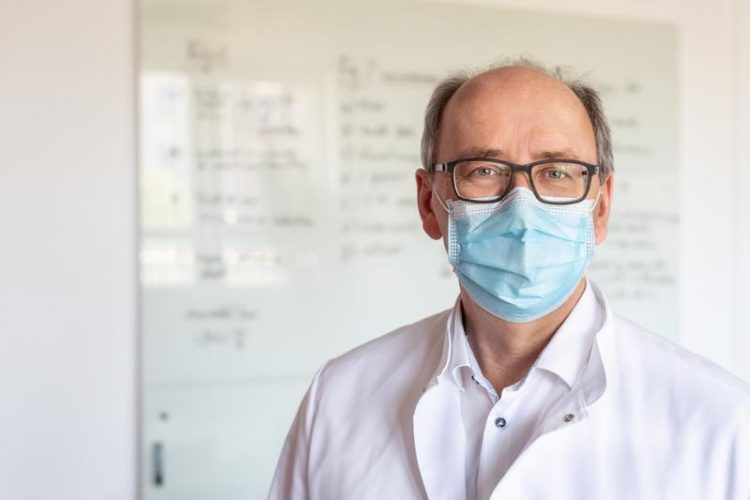Improving immunotherapy for cancer

Prof. Percy A. Knolle A. Heddergott / TUM
Our immune system not only protects us against infection, but also against cancer. This powerful protection is based in particular on the activation of special cells of the immune system, CD8+ T cells. These cells recognize infected or cancer cells and kill them specifically.
“The ability of the immune system and especially CD8+ T cells to eliminate cancer cells in tissues such as the lung, gut and liver is often limited in tumor patients,” explains Percy Knolle, Professor of Molecular Immunology at the Technical University of Munich (TUM).
Administration of antibodies can reinvigorate the cancer patient´s immune response
Cancer cells send out signals that slow down the immune response against them. The knowledge of how tumor-specific immunity is restricted by these signals has led to the development of immunotherapies against cancer through what is referred to as checkpoint inhibition.
In this form of therapy, the signals emitted by cancer cells are inhibited and unleash cancer-specific immunity. Administration of antibodies that target these signals (“checkpoint inhibition”) often can reinvigorate the patient´s immune response against the tumor.
Novel suppressive mechanism discovered that inhibits cancer-specific immune responses
The TUM research group led by Dr. Bastian Höchst and Prof. Percy Knolle at the Freising-Weihenstephan site and the University Hospital Klinikum rechts der Isar in Munich, together with researchers from the University of Heidelberg and the Otto von Guericke University Magdeburg as well as Yale University in the US, has discovered a novel mechanism of suppression that inhibits cancer-specific immune responses.
According to their recent publication, this suppression is mediated by a breakdown product from glucose metabolism. A particular type of myeloid immune cell (myeloid suppressor cells), which suppresses the activation of CD8+ T cells, are often found near and in tumor tissues. They are known to severely limit cancer-specific immunity.
“We were able to identify the excessive production of the breakdown product from glucose metabolism as a characteristic feature of suppressor cells in the tumor and at the same time to attribute inhibition of cancer-specific immunity to this suppressive metabolite,” explained Dr. Bastian Höchst.
New method to activate immune cells to kill tumor cells
The researchers found that inhibition of cancer-specific CD8+ T cells is enforced by this suppressive metabolite through depletion of amino acids that are essential for the activation of immune cells. Such inhibited immune cells remain alive, but are arrested in hibernation-like state of low metabolic activity.
The researchers succeeded in developing methods, with which these “hibernating” immune cells can be re-awakened. The combination of “checkpoint inhibition” with neutralization of the suppressive metabolite led to a strong increase in cancer-specific immune response in experiments.
“These results will lead the way to development of new forms of immunotherapy against cancer,” summarized Prof. Knolle.
Prof. Dr. Percy A. Knolle
Technical University of Munich
Institute of Molecular Immunology
Phone: +49 89 4140 – 6921
percy.knolle@tum.de
Dr. Bastian Höchst
Technical University of Munich
Research Group Leader
Phone: +49-89-4140-6754
bastian.hoechst@tum.de
T. Baumann, A. Dunkel, C. Schmid, S. Schmitt, M. Hiltensperger, K. Lohr, V. Laketa, S. Donakonda, U. Ahting, B. Lorenz-Depiereux, J. Heil, J. Schredelseker, L. Simeoni, C. Fecher, N. Körber, T. Bauer13, N. Hüser, D. Hartmann, M. Laschinger, K. Eyerich, S. Eyerich, M. Anton, M. Streeter, T. Wang, B. Schraven, D. Spiegel, F. F. Assaad, T. Misgeld, H. Zischka, P. J. Murray, A. Heine, M. Heikenwälder, T. Korn, C. Dawid, T. Hofmann, P.A. Knolle & B. Höchst (2020): Regulatory myeloid cells paralyze T cells through cell-cell transfer of the metabolite methylglyoxal. In: Nature Immunology. DOI: 10.1038/s41590-020-0666-9. (https://www.nature.com/articles/s41590-020-0666-9)
https://mediatum.ub.tum.de/1544218 (High-resolution images)
https://www.tum.de/nc/en/about-tum/news/press-releases/details/35987/ (Prof. Knolle also heads research on Covid-19. Prof. Knolle and his team investigate the immune response of patients with particularly severe courses of the disease. He also co-leads the clinical trial on seroprevalence of SARS-CoV-2 specific antibodies in hospital workers at the Klinikum München rechts der Isar, see press release.)
Media Contact
All latest news from the category: Health and Medicine
This subject area encompasses research and studies in the field of human medicine.
Among the wide-ranging list of topics covered here are anesthesiology, anatomy, surgery, human genetics, hygiene and environmental medicine, internal medicine, neurology, pharmacology, physiology, urology and dental medicine.
Newest articles

Bringing bio-inspired robots to life
Nebraska researcher Eric Markvicka gets NSF CAREER Award to pursue manufacture of novel materials for soft robotics and stretchable electronics. Engineers are increasingly eager to develop robots that mimic the…

Bella moths use poison to attract mates
Scientists are closer to finding out how. Pyrrolizidine alkaloids are as bitter and toxic as they are hard to pronounce. They’re produced by several different types of plants and are…

AI tool creates ‘synthetic’ images of cells
…for enhanced microscopy analysis. Observing individual cells through microscopes can reveal a range of important cell biological phenomena that frequently play a role in human diseases, but the process of…





















